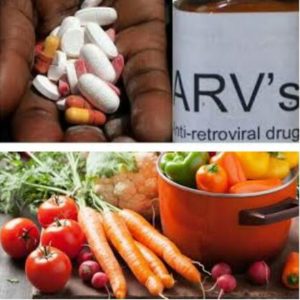HIV/AIDS [human immunodeficiency virus] is a virus that attacks the immune system, it infects and destroys certain white blood cells called CD4+ cells and if too much of these cells are destroyed, the body can no longer defend itself against infections. Having HIV doesn’t mean you have AIDS. The last stage of HIV infection is what brings about AIDS. When HIV is diagnosed before it becomes AIDS, medicines can slow the damage in the immune system.
TYPES OF HIV
- HIV-1, this one causes all the cases of AIDS worldwide
- HIV-2 this one causes an AIDS like illness, this type is not common.
CAUSES OF HIV
It is caused by human immunodeficiency virus, you can get HIV through contact with infected blood, semen or vaginal fluid.
- Unprotected sex also causes HIV.
- Sharing drug needles with an infected person.
- Mother to child transmission I; e during breastfeeding.
- Also, by kissing or sharing drinking glasses with an infected person.
FACTS ABOUT HIV/AIDS
- It is not a death sentence you have nothing to worry about.
- Starting antiretroviral treatment early and sustaining it as part of your daily life routine is the best way of ensuring that your immune system stays strong.
- Healthy eating, regular exercise, and getting enough rest are all good ways to maintain your health.
- Your mental wellbeing is important just as your physical health, talk about your concerns with friends and family or support groups they really help.
HIV should not stop you from living a full and healthy life, with the right treatment and care you can live just as long as a person who doesn’t have the virus. Having HIV/AIDS may put you at greater risk of getting heart disease and type 2 diabetes and certain types of cancer. However, eating a healthy diet may help reduce the risk of developing these conditions. Eating well can minimize symptoms associated with HIV, lessen the side effects of medication, increase your equality of life, and improve your resistance to other infections and complications.
FOODS TO INCLUDE IN YOUR DIET
- EAT ADEQUATE PROTEINS. People with HIV may have slightly high protein needs than people without the virus. Protein is needed to make, repair and maintain all the cells in your body, also needed for hormones, enzymes and components of your immune system. These protein include poultry, fish, low-fat daily food, eggs and legumes such as beans and lentils.
- EAT PLENTY OF FRUITS AND VEGETABLES. They are high in nutrients called antioxidants which protect your immune system. Aim to have 5 to 9 servings of produce each day and remember to eat different produce in order to get the most vitamins and minerals.
- EAT PLENTY OF STARCHY CARBOHYDRATES to give you energy for example brown rice, potatoes, whole meal pasta, and bread.
- LIMIT YOUR SUGAR AND SALT. Whether it is because of the virus or the treatment drugs you are taking, HIV raises your chances of getting heart disease. Too much sugar and salt can harm your body. So aim to get less than 10% of your calories each day from foods and drinks with added sugar.
- HAVE HEALTHY FATS IN MODERATION. Fats provides energy, but it is also high in calories. If you are not trying to gain weight limit how much of it you eat, heart healthy choices includes nuts, vegetables, oils and avocado.
- DRINK PLENTY OF FLUIDS. Make sure you have at least 8 to 10 cups of water every day. Liquids help carry nutrients and flush out used medications from your body.
- ALWAYS FOLLOW FOOD SAFETY RULES. HIV lowers your body defense against germs, a mild case of food poisoning can lead to a serious infection or illness.
Apart from having a balanced diet, being active is also essential for people with HIV it helps build your muscles, keeps your bones strong, burn fat and keep your heart healthy. Some exercises can help you. for example:
- RESISTANCE TRAINING. This increases the strength of your muscles by lifting weights for a period of time.
- CARDIO OR AEROBIC EXERCISES. This increases your heart rate which enables blood flow right around your body delivering oxygen to your muscles and keeping your heart and lungs healthy.
- FLEXIBILITY TRAINING. This stretches different parts of your body to strengthen the muscles and joints. Try stretching before and after any exercise you do.
HOW TO BOOST YOUR IMMUNE SYSTEM.
When you are living with HIV, it is very important to protect your immune system every day. You need to incorporate healthy lifestyle habits to minimize the side effects of this virus.
- STOP SMOKING. Smoking cigarettes kills white blood cells and different enzymes in your body, weakening your immune system. Long term smoking makes breathing difficult, which brings about less oxygen in your blood limiting the nourishment of the red blood cells, which then cannot rely on the white blood cells for help, creating a downward spiral for your immune system.
- ELIMINATE STRESS BY CONTROLING YOUR BLOOD PRESSURE. Chronic stress has been known to increase your blood pressure, and the associated hypertension suppresses your immune system.
- GET AN ADEQUATE AMOUNT OF SLEEP. Lack of sleep causes all kinds of problems in your body and it also breaks down your resistance to things like colds and flu.
- MAINTAIN A PROPER WEIGHT. Obesity leads to many immune system malfunction, and being a little bit overweight contributes to an imbalance.
- AVOID DRINKING TOO MUCH ALCOHOL. Excessive alcohol consumption will damage your immune system in 2 ways. First it reduces your white blood cells count which fight infections, 2nd alcohol causes ‘blood sludging’ a process whereby red blood cells clump together, thus allowing smaller blood vessels to plug up, limiting the amount of oxygen your organs and immune system receives.
- TAKE APPROPRIATE STEPS TO AVOID INFECTIONS AND BACTERIA. Washing your hands numerous times daily will prevent a lot of different viruses from entering your body.
- PRACTICE SAFE SEX. Understand how the virus is transmitted to reduce the risk of infecting others and yourself as well. Use condoms not only to prevent its spread but to protect both you and your partner against STD’S.
- FOLLOW YOUR DOCTORS ORDERS ABOUT YOUR PRESCRIPTIONS. It is crucial to take your HIV medications exactly as prescribed by your doctor, skipping even one day of medication can give the virus an opportunity to become resistant to the drug, making them ineffective against the virus.
- DO A BOWEL CLEANSE Your colon traps all sorts of toxins that your body cant process, and a colon cleanse promotes healthy intestinal bacteria. When you evacuate your bowel, your intestines tells your brain that new bacteria are being assembled in your colon and your brain creates a sort of pro-biotic to handle the new bacteria.
- SEE YOUR DOCTOR ON A REQULAR BASIS. Keeping up with your body is the best way to know if something is wrong. Your doctor can give you regular wellness evaluations and your health in general.












